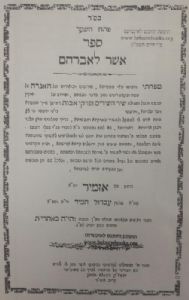A Short Tribute
Hacham Abraham Pontremoli was born to Leah and Hacham Haim Benjamin Pontremoli in Izmir, Turkey.
He learned Torah from his father, Hacham Haim Benjamin Pontremoli, author of entitled Petach Dvir. His maternal grandfather, Hacham Joshua Abraham Crispin, was Hacham Bashi of Izmir and the author of Abraham BaMahazeh. Hacham Abraham Pontremoli flourished and with time became a great and erudite rabbi, deeply involved in all aspects of Torah and Halakha, as testified by Hacham Abraham Palagi, Izmir's rabbi, in his writings.
Hanoch LaNa'ar, Hacham Pontremoli's first book, was written in Ladino using Hebrew letters and published in 1867. Its collection of morals and stories relates to human life in its entirety, from birth to death, and includes a seder for the Channukat HaBayit new home dedication ceremony.
In 1881 a great fire broke out in Izmir, destroying entire sections of the city and adding disaster to the frequent local outbreaks of cholera of that time. Hacham Abraham Pontremoli's son, Nissim Aaron, who was about to be married, died in the fire. Hacham Pontremoli dedicated 'Eved Avraham, his book of commentary on the Selichot published that year, in his name. He added a sermon eulogizing his son at the book's end. In 1887, Asher L'Avraham, his book of commentary on the Passover Haggadah and the Song of Songs, was published.
Hacham Abraham passed away on 29 Tishrei, 5651 (1891).
A few quotes from the Rabbi on 'Traditions of the Fathers' in which his teaching warns bridegrooms not to spend more on their weddings than they can afford
"Be careful about governance" – even beyond what is permitted. You may consume kosher meat and permitted wine and the like, but even if they are permitted, it is forbidden to be wicked within the limits of the Torah's law, as our renowned Sages, of blessed memory say. This is even more the case when great expense is involved…from which comes this warning to some young men who spend much more than they can afford on their weddings, selling their clothing and furnishings to revel in delicacies and wine, as though they were of royal descent. "Eat, friends, and drink; drink deep, loving companions" while they, having neither friends nor companions, scatter monies without measure. Some will remain penniless after the wedding, with no funds left for the commerce or craft required to respectably earn their living. One to whom God has granted common sense will "conduct his affairs with equity", in keeping with his means and no more, for his friends and companions, having eaten and drunk with him on his wedding day, will be silent in his hour of distress and leave him on his own when he is tending to his troubles.
Asher L' Avraham, New Interpretations and Commentaries on the Haggadah, Song of Songs and Ethics of Our Fathers, p.56a, printed by the author, Izmir 1877
